Having passed the halfway mark on Disc Four, we’re officially into the back half of the series — though still in the front half of the decade…
#11 Big Country, ”In a Big Country” (1983)
Peaked at #17 in the Hot 100. Reached #3 in Canada, a bigger country than the US.
Jon Cummings — I guess we’re all supposed to defer to Mr. Giles here, so I’ll just say, man, we thought those bagpipe guitars were cool. Shah!
Jack Feerick — Jesus, take the wheel; I can’t even pretend to be objective about these guys. Big Country may not have been an important band per se, but they were important to me. They made two-and-a-half genuinely great albums, and even if their drop-off was quick and steep, I will always give them a pass for that. They weren’t afraid of uplift, they weren’t afraid of optimism, and they gave me strength during some times in my life when I needed strength. Our own Mike Duquette makes the case better than ever I could.
That sense of hope is what made Stuart Adamson’s death by his own hand so goddam upsetting; it seemed like the ultimate betrayal of everything his music stood for.
Dw. Dunphy — A good band that made a quick, sudden impact but never equaled the hit. They’re still around in fact. Mike Peters of The Alarm is with them.
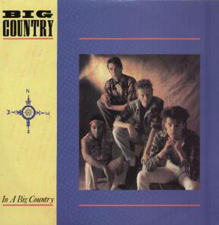 Feerick — Not just Mike Peters — apparently Derek Forbes, who played on Simple Minds’ best records, is handling bass duties (Watson and Forbes played together in a festival act called FourGoodMen back in 2006-2008). That line-up is an all-out supergroup, that is. Not sure where Tony Butler is in all of this; he was part of the 2007 BC reunion — in fact he took lead vocals — but he’s nowhere to be seen this time.
Feerick — Not just Mike Peters — apparently Derek Forbes, who played on Simple Minds’ best records, is handling bass duties (Watson and Forbes played together in a festival act called FourGoodMen back in 2006-2008). That line-up is an all-out supergroup, that is. Not sure where Tony Butler is in all of this; he was part of the 2007 BC reunion — in fact he took lead vocals — but he’s nowhere to be seen this time.
Dunphy — In any case, I generally have difficulty with a band that has a song that is named (in whole or in part) after the band itself. It strikes me as the ultimate statement of having run out of ideas.
Feerick — Really? Out of ideas? Because I would bet you a tin of shortbread cookies that the song came first and the name came later. It happens all the time. Getting back to Mike Peters: his as-yet-unnamed band used to play a number called ”Alarm, Alarm.” And they ended up keeping the name (and dropping the song).
When it comes later in the career, sure — I’ll grant you that neither ”My Name Is Prince” nor ”We Are The Clash” is anybody’s finest moment. (On the other hand, there’s also ”Clash City Rockers” and ”This Is Radio Clash” to contend with, both of which are pretty great.)
Dave Lifton — I love the sound and there’s a surprising amount of energy coming from what sounds like a very layered production. But there’s something about it that’s makes it hard for me to elevate it to the ranks of “New Wave Classic.” Too many quarter notes and not enough syncopation, maybe.
David Medsker — Oh, how I loved these guys. Oddly, though, I tired of this song really quickly, something that was only exacerbated once I heard “Wonderland,” still my favorite song from these guys. That CD of 12″ mixes I bought in the early 2000s is one of my prize possessions.
Feerick — Those remixes exemplify exactly what it is about this band. In the extended mixes done by Steve Lillywhite (who also produced the album tracks), one of the things he does is to spotlight individual instrumental passages — spotlighting, in the process, Big Country’s determination to be entirely original. They’re thinking about every detail, not taking anything for granted. The rhythm section doesn’t settle for the usual rock n’ roll tactics. Mark Brzezicki’s not playing the go-to 4-4 pattern, Tony Butler’s not riding the root note — unless there’s a damned good reason to do so. Even the simplest rhythm guitar part is thought-out and crafted with care, taste, and skill. Listen to the way the guitars speak to each other on ”In a Big Country” — arpeggios and partial chords, always in constant motion. And when the hammering power chords do come in on the breakdown, I lose my breath a little.
I will admit, though, that the video is kind of hysterical — shot and edited in such a way as to eliminate any sense of peril from these various allegedly-adventurous activities. Never has roaring around on ATVs looked so un-badass! Never has the pursuit of a mysterious woman seemed so mundane! Never has deep-sea diving looked so dorky! Never has rock-climbing looked so utterly safe and undangerous! Never has treasure-hunting seemed so unthrilling!
#12 The Fixx, ”One Thing Leads To Another” (1983)
#4 US Hot 100.
[youtube id=”JHYIGy1dyd8″ width=”600″ height=”350″]Cummings — I was never a fan of this song. Too shrill, too angular for me. (I like “angular” as a word to describe a rock song.) I know there are lots of aFixxionados hereabouts, but I’m not one of you. So it goes.
Feerick — ”One Thing Leads To Another” is kind of a founding document of the ”robot funk” I was banging on about a while back. Sparse, immaculately constructed, no extraneous parts. The individual elements may not work in isolation — that spiky, off-kilter rhythm guitar, the weird keyboard squelches, the handful of bass notes — but then the gears mesh and this big clanky machine lurches into motion and just keeps chugging on, and seems like it will never stop.
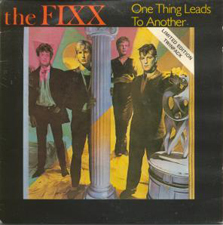 Lifton — I’m with Jon on the shrill aspects but not the angularity. I always dug that. The synth stabs sound like an affectation 30 years on but it was cool then. Listening to it now I’m really digging the bassline. You could copy this note for note today and have an indie hit with it,
Lifton — I’m with Jon on the shrill aspects but not the angularity. I always dug that. The synth stabs sound like an affectation 30 years on but it was cool then. Listening to it now I’m really digging the bassline. You could copy this note for note today and have an indie hit with it,
Medsker — I loved this song at the time, but man, it has not aged well. Actually, nothing from Reach the Beach has aged well, and I really liked that album at the time.
Dunphy — For all the reasons Jon dislikes the Fixx, I like them. The whole thing about the “angularity” gave the group a rock edge even though they were firmly a pop band, at least during this period. Without Cy Curnin’s clipped singing style, and the janky, rhythmic guitar lines, “One Thing Leads To Another” would probably been indistinct from any of the other stuff on the radio. While I do like the Walkabout album, you can hear what I’m talking about with its primary single “Secret Separation.” Reach The Beach, not only for this song but for the better part of its full tracklist, was consciously striding between these two sounds, pop and rock, and worked for me.
#13 After the Fire, ”Der Kommissar” (1982)
US Top 5. Originally performed by Falco; also quasi-covered by Laura Branigan.
Dunphy — But this one doesn’t work for me at all. White guys copying a German guy while copping a Kurtis Blow flow. It sounds now like a go-to when somebody wants to call up the ’80s in a movie. What song sounds like the ’80s in a nutshell but isn’t interesting enough to distract you? “Der Kommissar.” Done.
Feerick — Ahem. I think you’ll find Falco was Austrian, thankewverymuch and God rest his soul.
Cummings — One day last fall I heard this and “Twilight Zone” on either end of a plane flight, and couldn’t remember which band did which song. I loved both of them as a 17-year-old, and tried to like Falco, too, because I thought I was supposed to. Then I realized he was just a Krazy Kraut who put nonsense noises where lyrics were supposed to be. (This song includes this list’s second use of the non-word “shah!”, by the way.)
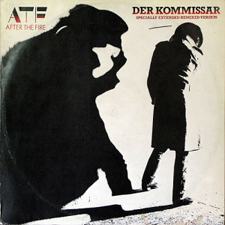 Lifton — Growing up in a Jewish household where we were told that everything German was inherently anti-Semitic, I avoided this as much as possible. It didn’t help that “Der Kommisar” sounded like the title of the man who was coming to round us all up. I wasn’t missing much.
Lifton — Growing up in a Jewish household where we were told that everything German was inherently anti-Semitic, I avoided this as much as possible. It didn’t help that “Der Kommisar” sounded like the title of the man who was coming to round us all up. I wasn’t missing much.
Feerick — So wait — you’ve never listened to Kraftwerk? Or Can? Or Neu!? Or, I dunno, David Hasselhoff? What cost, Deutschophobia?
Medsker — It was the instrumental build-ups that hooked me. The acoustic guitar. The verses and even the chorus were a distant second to all of the individual guitar riffs (especially the acoustic guitar) and keyboards and that little slap back hand clap.
Feerick — Exactly. I’m loath to repeat what I’ve written elsewhere — in this case, on our mega-list piece on the All-Time Greatest Cover Songs — but the arrangement is the real star of this record. Let’s compare and contrast with the original…
[youtube id=”_w4Xulsjo5I” width=”600″ height=”350″]After the Fire are copping the framework from Falco, treating his original like a demo, and then hanging all their own favorite sounds on it. Case in point: the six or seven distinct different guitar tones that pop in and out, and how they create a sense of conversation amongst themselves.
Take the main riff, coming in at :17. In after the Fire’s version, first guitar asks a question, second guitar answers it. They go back and forth like this a couple of times, and then a third guitar comes in and offers a rejoinder. I think there’s a real sense of fun there.
And I like how the dude counts down ”1, 2, 3″ in German, just as Falco does in English. Actually, Falco slips in a lot of English in his version. Now I kinda wish the ATF version did a a one-for-one substitution throughout. But that would make the chorus, ”Can you dig it, Commissioner?” Which lacks a certain somethin’-somethin’.
#14 The Motels, ”Suddenly Last Summer” (1983)
#9 on the Hot 100.
Dunphy — Of the Motels three singles, this one is the least for me. “Only The Lonely” and “Shame” both have stronger hooks, and the pitter-patter of percussion on “Suddenly Last Summer” can get irritating after too long, but I like Martha Davis. She was working a big, pouty voice without slipping into squeaks like Dale Bozzio or Lene Lovich.
That said, the actual Motels albums were pretty darn weak. Whoever was responsible for pulling the singles did their job well, though.
Cummings — Hate the Motels. Hate Martha Davis’ voice. Mannered, mannered, mannered. This list (apart from Big Country) is making me cranky.
Lifton — Yeah, this song sucks, but Jon, there’s no need to be so cranky. Just relax, and if you need to chill out, throw on some Dionne Warwick. I find her music very soothing.
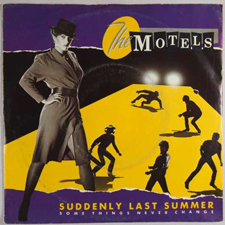 Cummings — I just threw up in my mouth a little. Motels or Warwick / Bacharach / David? Thanks for placing me between Scylla and Charybdis, Dave.
Cummings — I just threw up in my mouth a little. Motels or Warwick / Bacharach / David? Thanks for placing me between Scylla and Charybdis, Dave.
Lifton — leprechaun dance
Medsker — I was a big fan of All Four One, and was crushed when I heard that this was the first single from their new album. So tame, and those drums… fuck.
Feerick — See, now, I like this just fine. The melodrama of the vocals is wholly appropriate, given the subject matter (either losing your virginity, or seeing your cousin torn apart and devoured by a hungry mob, depending on how closely we’re hewing to the Tennessee Williams play).
I even like those drums. Dig the obvious layering of the record. The backing sounds like a demo — cheap Rhythm Ace, overdriven keyboards on a bedroom four-track with needles in the red. That’s overlaid with slickly-produced vocals and instrumental details; cymbal splashes, tambourine, the distant buzz of guitars. There’s a tug, a tension between homemade and professional. It’s a cool effect.
It’s not a patch on ”Only the Lonely,” mind you, but it’ll do.
#15 Culture Club, ”Karma Chameleon” (1983)
The band’s only US #1 single.
Dunphy — This is a good song in small doses because the chorus works so well — too well, in fact. Having “karmakarmakarmakarmakarma” in there assured that the song would be a hit. It’s just too strong a hook. But when it gets lodged in your brain for the rest of the day, intrigue and enjoyment turn to annoyance. I dare anyone to listen to this song straight through and not have the “karmakarmakarmakarmakarma” earworm gnawing at your noggin tonight.
Feerick — I never had much use for Culture Club, sadly, aside from the brilliant ”Time (Clock of the Heart).” This sounds like something the Wiggles would cut from the show for being ”too simplistic.”
Anyway: I’m guessing that ”karma chameleon” means that the moral meaning of a given action changes depending on the context in which it is undertaken. Which is pretty deep, I guess. But why are the colors of George’s dreams ”red, gold, and green”? The latter two would seem to indicate a lust for wealth; but all three together — those are the colors of Rastafarianism, and more generally of African consciousness. Is he expressing a coded affection for Mikey Craig?
These are the things I thought about as a kid. Now, mostly, I don’t think about ”Karma Chameleon” at all.
Cummings — Having dressed as Boy George for Halloween 1984 … and having been dressed down as “naive” by the man (?) himself a month later, during a press conference preceding a Culture Club gig at the Rosemont Horizon outside Chicago, for daring to suggest that “The War Song” had been written to ride Frankie Goes To Hollywood’s coattails …
Medsker — Not long after its release, Boy George admitted that “The War Song” was crap, so I’d say you’re even.
Cummings — Oh, there’s much more to story. Right after George called me “naive,” Roy Hay followed with a minute or so of patter about how FGTH was the biggest group going and “Two Tribes” was a huge hit, and how it was hardly “naive” to assume that Culture Club and every other British group was watching them and trying to figure out how to compete in the marketplace. George shot Roy a truly lethal look.
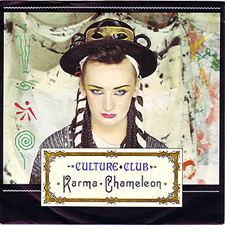 Anyway, after the presser ended I left the ballroom and got lost in the hallways of the hotel — and wound up face-to-face with the boys on their way out. George recognized me and apologized for being nasty — and I said I was glad I’d given him a respite from providing makeup tips. He laughed, we moved on — and that night at Rosemont Horizon, Culture Club came onstage about 95 minutes late and gave a pretty atrocious show.
Anyway, after the presser ended I left the ballroom and got lost in the hallways of the hotel — and wound up face-to-face with the boys on their way out. George recognized me and apologized for being nasty — and I said I was glad I’d given him a respite from providing makeup tips. He laughed, we moved on — and that night at Rosemont Horizon, Culture Club came onstage about 95 minutes late and gave a pretty atrocious show.
Feerick — That’s a great story. And somehow I’m not surprised that they couldn’t deliver the goods live.
Cummings — I must say I have a complicated relationship with songs like “Karma Chameleon.” I can say with certitude that it’s my favorite Culture Club single. (Maybe second favorite, after “Church of the Poison Mind.”) But that’s not saying much.
Lifton — When I became a soccer fan, it cracked me up to learn that the melodies for this and “Go West” have been appropriated by English fans for soccer chants (the latter through the hit by the Pet Shop Boys) — these working-class, macho guys who would beat you up for wearing the wrong team’s shirt would be singing songs by openly gay men. I still like this song.
Medsker — I have to admit, this is a damned good pop tune. It’s funny how hard it was back then for me to admit when Culture Club did something good (I second the nod for ”Church of the Poison Mind”), like I was too macho or something. (I’m not macho.)





Comments